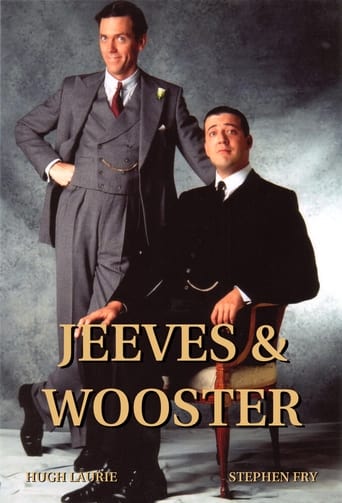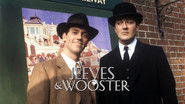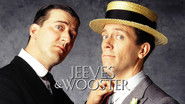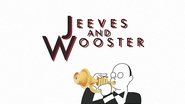burrhus1
Anyone who has seen Hugh Laurie in TV's House won't recognize him as the bumbling Bertie in this series. What an incredible goofball! Of course, each episode has the same basic plot:1. Bertie encounters an uncomfortable social situation amongst his wealthy early 20th century British friends and relatives. 2. Bertie asks his butler Jeeves' advice. 3. Jeeves' advice gets him into much deeper trouble. 4. Bertie thrashs around to extricate himself but fails. 5. Jeeves comes to the rescue with a risky but brainy solution. 6. Bertie escapes by the skin of his teeth. 7. Jeeves quietly takes credit for the escape and escapes blame for creating the trouble.So, you probably wouldn't want to watch 5 or 6 of these in a row. But, in small doses, these are great!
cobaka
I watched the show before reading the books, but I absolutely adore both. As others have said, the casting of the two main characters is perfect, though i wish Fry could've had more of a chance to show off.There are a few notable differences between the two mediums, none of which hamper the viewer/reader's pleasure any. In the show, for instance, Jeeves seemed to be more warm-hearted than in the books, where he seemed to me to be more of an untouchable impressive figure, almost cruel at times to Bertie, though always pulling him out of trouble in the end. Fry's portrayal was preferable to the books' character, for me, because I enjoyed the more casual relationship. In the books, Jeeves was almost a father figure, not nearly so close.One reason i enjoy the show so much is the way it ignores pressing world issues. The prohibition is in full swing over in America, but that is only referenced in one episode. The depression is about to hit, and the entire world is going to feel it, perhaps even Bertie. I've always found this fact to make my viewing all the more interesting, because Bertie and his friends take their wealth so casually. The books are written from Bertie's perspective, and as it's plausible that he would ignore socialism and other radical reform movements, economic disputes, prohibition, and other strife synonymous with the 20s, then so would the show. It's a wonderful departure from reality, into a world where your only worry is how to weasel out of unwanted engagements to less-than-admirable girls, or how to avoid your overbearing aunt.It's all of these things that really put the Wodehouse stories and their subsequent television adaptations close to my heart, but it's the lovable characters and the flawless portrayal of them by each respective actor that keeps me drawn to watching this show over and over again.
diayag
I agree the cast changes, and definitely the loss of the original Aunt Agatha, affect reaction to the series as a whole, but not necessarily individual episodes or seasons. To see characters switch from one role to another unrelated role was a bit disconcerting. The series 3/4 Gussie was a bookie in series 1; the original Marilyn Bassett becomes Florence Cray in 3/4. It was a monumental task, however, to put all 50 stories into one shorter body of work and this does the job well. I agree somewhat, about the accents: Janan Kubba's New York accent was delightful if odd. The mistake in most Brit productions is they don't hear a difference between Americans and Canadians. Some actors were Canadians and hence (apparently) sounded American to the BBC. I can tell the difference between a Northern dialect, Londoner and Welshman but was stunned tonight (for instance) watching a BBC production ("Carrie's War"), in which an "American airman" was identified as being from Pennsylvania (where I live) and having a southern drawl. Maybe we are picky; maybe we are more conscious because we watch more Britcoms than the average American. And maybe the majority of Englishman wouldn't notice that "aboot" is not something you'd hear south of the Canadian border. These are minor. The later episodes ARE more ridiculous and goofy, but I watch them on a regular basis. Laughter is precious; this is a clean, non-demeaning, and very pleasant escape that even the young members of the household can enjoy. How rare is that?
Andrei Pavlov
In case with "The Thin Blue Line" the spoiler was in the form of background giggles, while in case with this serial the spoiler is the characters' switch. The short sight of those English persons, who created these TV classics is amazing. They could make everything else perfect but fell flat upon the even ground. It's so sad, that there are tears in our eyes. They make a cast change even for aunt Agatha. What a piece of nonsense. Couldn't the producers keep the cast unchanged during the production? After all, it's been only 23 parts, not 200+ parts like in dumb "housewife serials".It's a raw deal with the classics. If the crew changes were due to finance only - shame upon us all. We have funds to push the rockets to Mars and to fund up "The Matrix Revolutions", but we could not make "Jeeves and Wooster" without changes in casting. Hamlet would say in this situation: "Remorseless, treacherous, lecherous, kindless villains!" Very disappointed, but nevertheless, shall give this extraordinary movie 8 out of 10. Thank you for attention.







